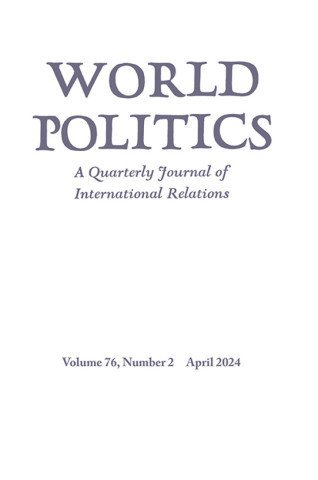The Generational and Institutional Sources of the Global Decline in Voter Turnout
IF 2.5
1区 社会学
Q1 INTERNATIONAL RELATIONS
引用次数: 19
Abstract
ABSTRACT Why has voter turnout declined in democracies all over the world? This article draws on findings from microlevel studies and theorizes two explanations: generational change and a rise in the number of elective institutions. The empirical section tests these hypotheses along with other explanations proposed in the literature—shifts in party/candidate competition, voting-age reform, weakening group mobilization, income inequality, and economic globalization. The authors conduct two analyses. The first analysis employs an original data set covering all post-1945 democratic national elections. The second studies individual-level data from the Comparative Study of Electoral Systems and British, Canadian, and US national election studies. The results strongly support the generational change and elective institutions hypotheses, which account for most of the decline in voter turnout. These findings have important implications for a better understanding of the current transformations of representative democracy and the challenges it faces.全球选民投票率下降的代际和制度根源
摘要:为什么世界各地的民主国家的选民投票率都在下降?本文借鉴了微观层面的研究结果,并提出了两种解释:代际变化和选择性机构数量的增加。实证部分检验了这些假设以及文献中提出的其他解释——政党/候选人竞争的变化、投票年龄改革、群体动员减弱、收入不平等和经济全球化。作者进行了两次分析。第一项分析采用了涵盖1945年后所有民主国家选举的原始数据集。第二部分研究了来自选举制度比较研究和英国、加拿大和美国国家选举研究的个人层面数据。结果有力地支持了代际变化和选举制度假设,这是选民投票率下降的主要原因。这些发现对更好地理解代议制民主的当前转变及其面临的挑战具有重要意义。
本文章由计算机程序翻译,如有差异,请以英文原文为准。
求助全文
约1分钟内获得全文
求助全文
来源期刊

World Politics
Multiple-
CiteScore
8.40
自引率
0.00%
发文量
24
期刊介绍:
World Politics, founded in 1948, is an internationally renowned quarterly journal of political science published in both print and online versions. Open to contributions by scholars, World Politics invites submission of research articles that make theoretical and empirical contributions to the literature, review articles, and research notes bearing on problems in international relations and comparative politics. The journal does not publish articles on current affairs, policy pieces, or narratives of a journalistic nature. Articles submitted for consideration are unsolicited, except for review articles, which are usually commissioned. Published for the Princeton Institute for International and Regional Affairs
 求助内容:
求助内容: 应助结果提醒方式:
应助结果提醒方式:


